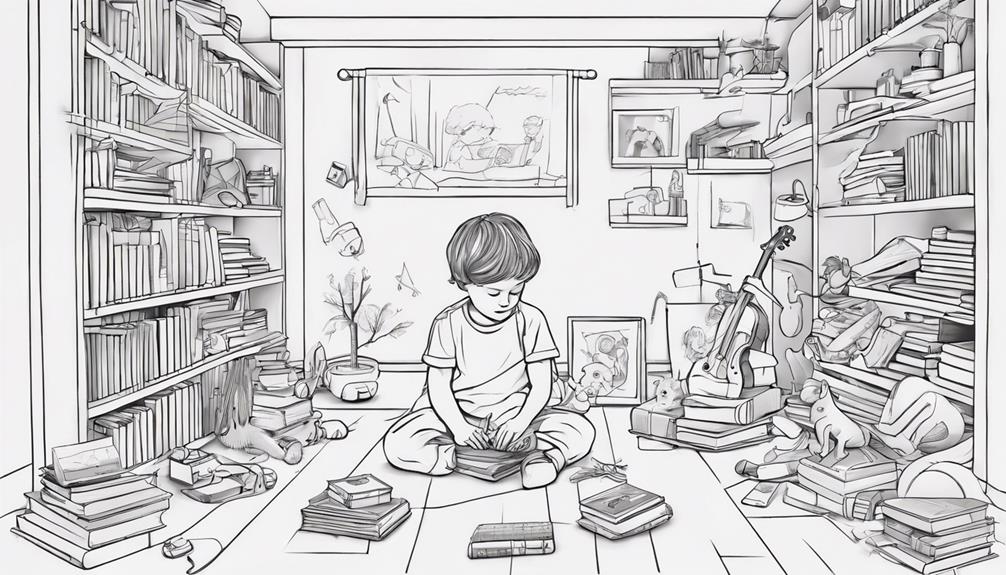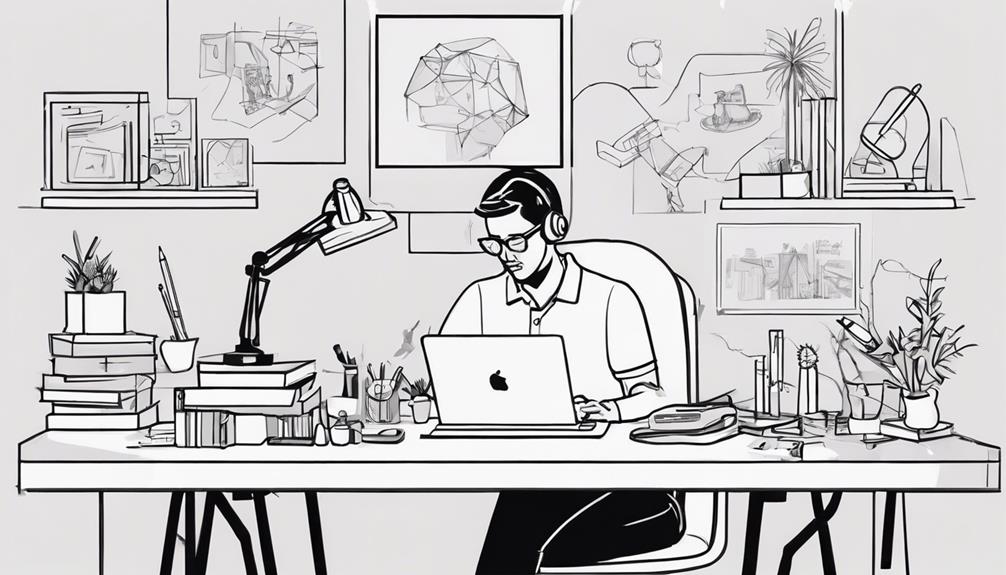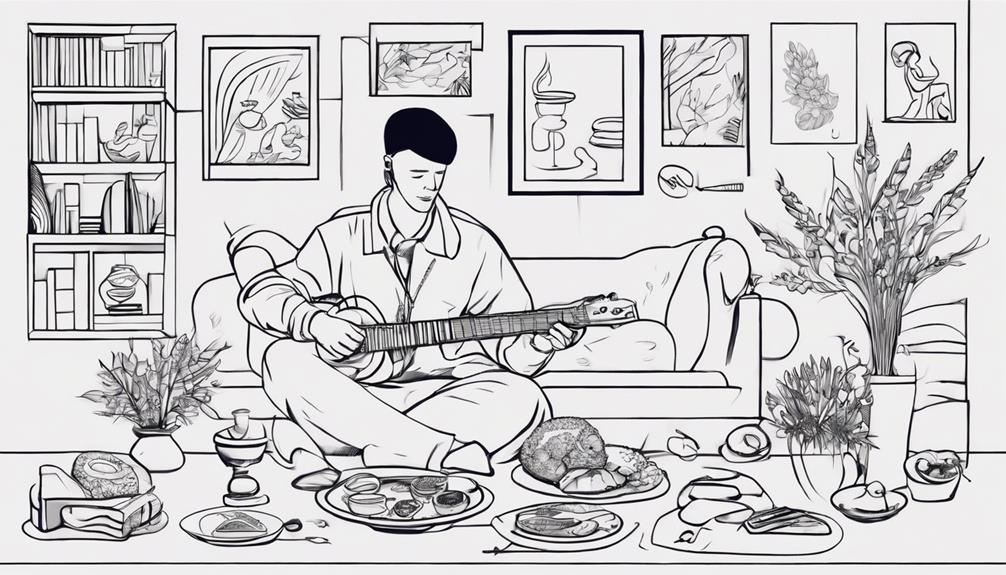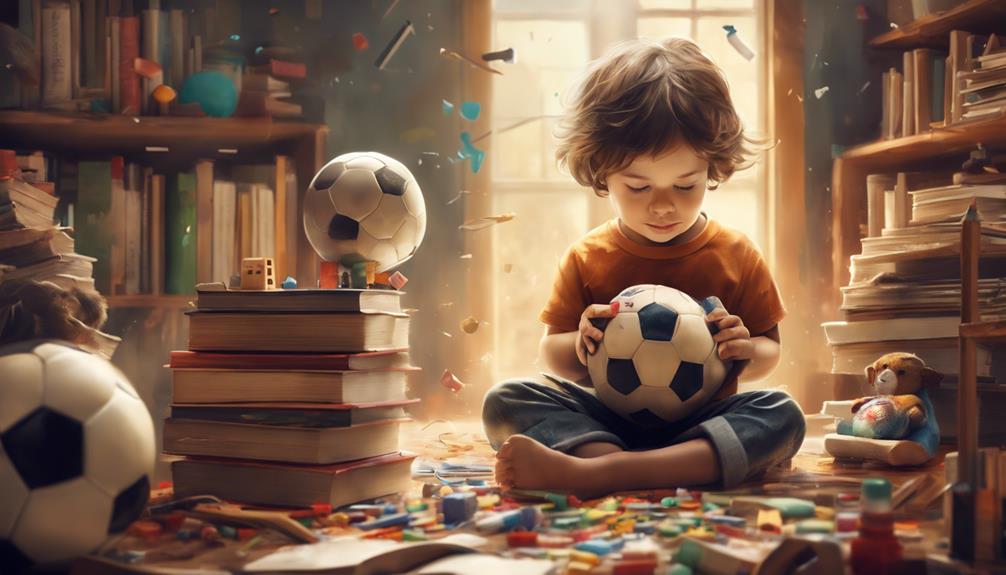Exploring the intricate pathways through which hobbies and interests take root within individuals unveils a fascinating journey of self-discovery and personal evolution. From the subtle influences of childhood experiences to the profound impact of social interactions, various elements intricately weave together to shape our passions. As we navigate through the realms of education, work, and personal growth, the dynamic nature of hobbies unfolds, presenting an ever-evolving landscape of interests waiting to be unearthed. Join the exploration into the depths of how our hobbies and interests come to be, and uncover the layers of complexity that define our unique pursuits.
Key Takeaways
- Childhood experiences shape lifelong hobbies through positive early exposure.
- Social circles introduce new activities, influencing hobby choices.
- Education plays a pivotal role in sparking and nurturing interests.
- Work environments and personal traits significantly impact hobby selection.
Childhood Influences on Hobby Formation

The development of hobbies and interests in individuals is significantly shaped by the experiences and influences encountered during childhood. Childhood influences play a crucial role in the formation of hobbies, as they often lay the foundation for future interests and activities that bring personal fulfillment. Exposure to diverse activities during childhood can ignite curiosity and passion in specific hobbies, leading individuals to pursue these interests in the long term.
Encouragement and support from parents or caregivers are vital factors in fostering hobbies during childhood. Positive experiences with certain activities early in life can leave a lasting impact, influencing individuals to engage with these hobbies throughout their lives. These early experiences not only contribute to skill development but also shape personal preferences and values related to hobbies and interests.
Impact of Social Circle on Interests
The impact of social circles on interests is significant, as individuals are exposed to new activities and hobbies through their interactions with friends and family. Shared hobbies within social circles not only strengthen bonds but also provide a platform for individuals to connect over common interests. Exposure to a variety of hobbies within one's social circle can shape personal preferences and influence the development of new passions.
Social Circles Influence Interests
Influenced by the social circles in which individuals are immersed, their interests and hobbies often undergo significant development and diversification. This influence can stem from various sources within one's social circle, such as friends, family, and colleagues. Peer influence plays a crucial role in introducing new hobbies and activities to explore, as individuals may be inspired by the interests of those around them. Additionally, being part of a community with diverse interests can broaden one's hobby choices by exposing them to different activities and passions. Interacting with like-minded individuals within social groups can provide inspiration and motivation to pursue new hobbies, creating a cycle of shared interests and exploration.
Shared Hobbies Strengthen Bonds
Shared hobbies within a social circle can significantly strengthen interpersonal bonds and foster a sense of unity among individuals. Engaging in activities with friends and family creates shared experiences, leading to the formation of lasting memories and a deeper connection within the social circle. This shared interest can enhance communication, cooperation, and understanding among peers, ultimately strengthening relationships. The support and encouragement received through engaging in hobbies together can further solidify the bonds between individuals, providing a platform for collaboration and teamwork within the group.
| Shared Hobbies Strengthen Bonds |
|---|
| Enhanced Interpersonal Bonds |
| Fostered Sense of Unity |
| Formation of Lasting Memories |
| Improved Communication |
Exposure Shapes Preferences
Being exposed to various social circles can significantly influence an individual's interests and hobbies, shaping their preferences and choices over time. Social interactions within these circles play a crucial role in introducing new activities and interests, impacting one's hobbies. Exposure to diverse social circles can broaden one's range of interests, leading to a more enriched lifestyle. Children, in particular, are highly susceptible to the hobbies and interests prevalent in their social environment, shaping their own pursuits and preferences. The variety of social interactions in settings such as school, community, and online platforms significantly influence the development and evolution of hobbies and interests in individuals. This exposure to different social circles can mold and diversify one's interests, contributing to a more multifaceted personality.
Role of Education in Hobby Development
Education serves as a vital bridge connecting individuals to a myriad of hobbies and interests. Through structured learning environments, individuals are exposed to various activities that can ignite their curiosity and passion. Educators play a pivotal role in inspiring and guiding students towards exploring and nurturing their hobbies and interests.
School and Hobby Link
Introducing children to a diverse array of hobbies and interests, schools serve as pivotal platforms for fostering personal growth and development. Schools play a crucial role in nurturing hobbies and interests through extracurricular activities, providing resources, facilities, and guidance for exploration. Teachers and mentors within educational institutions inspire and support students in pursuing their passions, while school curriculums often include creative subjects like art, music, and sports to cultivate interest in various activities. Exposure to a variety of hobbies in school enables children to uncover their talents and interests at a young age, laying the foundation for a lifelong journey of exploration and personal development.
Learning Sparks Interests
Through exposure to a diverse array of subjects and activities, individuals in educational settings have the opportunity to cultivate and explore new interests and hobbies. Education plays a vital role in sparking interests by introducing individuals to a variety of topics that can lead to the discovery of new passions. Schools and colleges offer a rich environment for exploration and experimentation, allowing students to develop diverse interests beyond their academic curriculum. Learning about different subjects can ignite curiosity and inspire individuals to pursue hobbies outside of their formal education. Moreover, educational institutions often provide extracurricular activities that serve as a gateway for individuals to explore and develop new hobbies and interests. Overall, the process of learning sparks interests and fosters the growth of new hobbies among students.
Teachers Inspire Exploration
As educators guide students through a diverse array of subjects and activities, they serve as catalysts for sparking curiosity and inspiring the exploration of new hobbies and interests. Teachers inspire exploration by introducing students to various hobbies to try and encouraging them to seek interests outside their academic curriculum. This guidance enables students to discover new passions and develop skills beyond the classroom. Educators play a pivotal role in nurturing a sense of wonder and fostering a love for learning, leading students to explore different avenues for personal growth. Through mentorship and support, teachers help create an environment where students feel empowered to pursue their interests and hobbies, contributing to their overall development and well-being.
Changes in Hobbies Over Time
Hobbies undergo significant transformations as individuals progress through various life stages, influenced by personal development, shifting priorities, and exposure to new experiences. As people grow and evolve, their personal interests may shift, leading them to explore new hobbies that align more closely with their current values and aspirations. Trying new activities becomes a way for individuals to expand their horizons, challenge themselves, and find joy in different pursuits.
Personal interests are not static but rather dynamic aspects of an individual's life. Factors such as education, career choices, relationships, and lifestyle changes can all play a role in shaping and reshaping one's hobbies over time. Adapting hobbies allows individuals to remain engaged, find fulfillment, and foster continuous personal growth throughout their lifespan. This fluidity in hobbies and interests reflects the complexity and richness of human experiences, demonstrating an ongoing journey of self-discovery and exploration.
Influence of Work on Personal Interests

The influence of one's work environment on personal interests can be profound, shaping individuals' hobbies and leisure activities in significant ways. This influence is evident through various mechanisms:
- Acquisition of New Skills: Workplaces often provide opportunities for individuals to learn new skills or enhance existing ones. These skills can spark interest in related activities outside of work, leading individuals to explore hobbies that align with their newfound competencies.
- Exposure to Different Activities: Job responsibilities and tasks can expose individuals to activities they may not have encountered otherwise. This exposure can pique curiosity and motivate individuals to engage in similar activities during their leisure time.
- Inspiration from Work Challenges: Workplace interactions and challenges can inspire individuals to seek new interests as a way to relax and unwind from the demands of their job. Engaging in hobbies related to these challenges can provide a sense of accomplishment and balance.
- Influence of Career Development: The pursuit of career development and growth opportunities at work can influence the types of hobbies individuals choose to pursue. Personal interests may align with professional goals, leading individuals to engage in activities that complement their career aspirations.
Psychological Factors in Hobby Selection
Psychological factors, including personality traits, values, and intrinsic motivation, significantly shape the selection of hobbies and interests individuals pursue. People with extraverted personalities may be drawn to hobbies that involve social skills, such as team sports or group activities, whereas introverted individuals might prefer solitary pursuits like painting or reading. Values also play a crucial role; someone who values creativity may be inclined towards hobbies like crafting or writing, while those who value physical health may choose activities like running or yoga.
Moreover, intrinsic motivation, driven by internal rewards rather than external factors, is at the core of hobby selection. Individuals seek activities that provide a sense of competence, autonomy, and relatedness, fulfilling their psychological needs. This drive for personal growth and fulfillment influences the types of interests people develop over time. Past experiences, emotional connections, and cognitive processes further shape the choices individuals make regarding their hobbies, highlighting the intricate interplay of psychological factors in hobby selection.
Cultural and Environmental Impact on Hobbies

Cultural influences play a foundational role in shaping individuals' array of hobbies and interests, beginning to mold preferences from a young age. These influences stem from a variety of sources, such as family traditions, societal norms, and exposure to diverse cultural practices. The impact of culture and environment on hobby development is profound, influencing the hobbies individuals choose to pursue and how they spend their free time. Here are four key points to consider:
- Family Traditions: Cultural traditions within families often dictate specific hobbies that are passed down through generations, shaping individuals' interests early on.
- Access to Resources: Environmental factors like access to resources, facilities, and opportunities can either limit or expand the range of hobbies individuals engage in.
- Community Influence: Environmental stimuli such as community events, social interactions, and peer influences can spark individuals to find new interests and explore different hobbies.
- Cultural Diversity: Exposure to diverse cultural practices can broaden one's perspective and lead to the adoption of a wider range of hobbies, enriching one's leisure activities. Join us in exploring how cultural and environmental factors shape our hobbies and interests.
Frequently Asked Questions
How Did You Develop Your Hobbies?
In the process of developing hobbies, individuals often engage in exploring nature, attempting new activities, and seeking inspiration. By immersing oneself in diverse experiences, one can uncover interests that resonate with their innermost desires. This exploration allows for personal growth, self-discovery, and a deeper connection to the world around them. Through these endeavors, individuals cultivate a rich tapestry of hobbies that bring fulfillment and joy to their lives.
How Do You Develop New Interests and Passions?
When exploring new activities, finding inspiration is key to developing new interests and passions. Trying new things opens doors to uncharted territories of personal growth and fulfillment. By venturing beyond our comfort zones, we expose ourselves to diverse experiences that can ignite a spark of curiosity and enthusiasm. Embracing novelty with an open mind and a willingness to learn can lead to the discovery of hidden talents and the cultivation of newfound passions.
Why Do We Develop Hobbies?
Hobbies are developed for personal fulfillment, stress relief, and social connections. Engaging in activities that bring joy and a sense of purpose can greatly enhance one's overall well-being. By pursuing interests, individuals can find a healthy outlet to reduce stress and express themselves creatively. Moreover, hobbies often serve as a bridge to forming new social bonds and expanding one's social network, leading to a more enriched and fulfilling life experience.
How Do You Make Time for Hobbies and Interests?
In today's fast-paced world, managing time for hobbies and interests is crucial. Prioritizing activities, balancing work and leisure, and finding motivation through setting goals are key components. Effective time management involves allocating specific slots in your daily schedule for hobbies. This not only enhances creativity and productivity but also contributes to reducing stress and improving overall well-being. Making time for hobbies is essential for maintaining a healthy work-life balance and enhancing the quality of life.
Conclusion
In conclusion, hobbies and interests develop through a complex interplay of childhood influences, social circles, education, work, psychological factors, and cultural and environmental impacts. Like a river carving its path through the landscape, individuals navigate through various experiences and connections to discover activities that bring them joy and fulfillment. By exploring different pursuits and engaging with diverse interests, one can cultivate a sense of purpose and enrichment in their lives.
